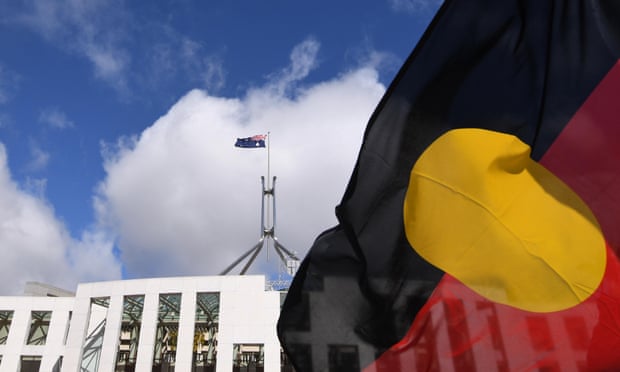Liberal MP Julian Leeser has resigned as shadow attorney general and minister for Indigenous Australians, less than a week after the Liberals confirmed they will oppose an Indigenous voice in the constitution.
Leeser, who is a supporter of an Indigenous voice, announced in a statement on Facebook on Tuesday morning he had resigned to campaign for a yes vote in the referendum.
“I want to assure you that I remain a proud Liberal committed to my party, the people of Berowra, and the leadership of Peter Dutton,” Leeser wrote.
“My resignation as a frontbencher is not about personality, it’s about keeping faith with an issue that I have been working on for almost a decade.”
“I’ve also tried to keep faith with my Liberal values. My desire to conserve our institutions like the Australian constitution with my desire to seek better outcomes for Aboriginal and Torres Strait Islander Australians.”
Leeser announced he will campaign for a model he put forward at the National Press Club last week, to remove the Indigenous voice’s power to advise parliament and the executive from the government’s proposed constitutional amendment.
“The Press Club model for the voice – is constitutionally sound, gives Aboriginal and Torres Strait Islander Australians a place in our founding document, and recognises the supremacy of parliament in our constitutional system.
“It improves the model put forward by the government and its referendum working group. This will also improve its chances for success at the ballot box.”
Leeser acknowledged “the support and good grace of Peter Dutton throughout the process and the faith he has shown in me”.
“However, on the voice referendum we find ourselves in different places. People of goodwill can disagree.”
Last Wednesday Dutton and deputy Liberal leader, Sussan Ley, announced that the Liberals will oppose putting the Indigenous voice in the constitution after a party room meeting endorsed that position.
What is the Indigenous voice to parliament and how would it work?
Show
What has happened already?
The Albanese government has put forward the referendum question: "A Proposed Law: to alter the Constitution to recognise the First Peoples of Australia by establishing an Aboriginal and Torres Strait Islander Voice. Do you approve this proposed alteration?"
The PM also suggested three sentences be added to the constitution:
- There shall be a body, to be called the Aboriginal and Torres Strait Islander Voice.
- The Aboriginal and Torres Strait Islander Voice may make representations to the Parliament and the Executive Government of the Commonwealth on matters relating to Aboriginal and Torres Strait Islander peoples;
- The Parliament shall, subject to this Constitution, have power to make laws with respect to matters relating to the Aboriginal and Torres Strait Islander Voice, including its composition, functions, powers and procedures.
How would it work?
The voice would be able to make recommendations to the Australian parliament and government on matters relating to the social, spiritual and economic wellbeing of Aboriginal and Torres Strait Islander people.
The voice would be able to table formal advice in parliament and a parliamentary committee would consider that advice. But all elements would be non-justiciable, meaning that there could not be a court challenge and no law could be invalidated based on this consultation.
How would it be structured?
The Indigenous voice co-design report recommended the national voice have 24 members, encompassing two from each state, the Northern Territory, ACT and Torres Strait. A further five members would represent remote areas and an additional member would represent Torres Strait Islanders living on the mainland.
Members would serve four-year terms, with half the membership determined every two years.
Photograph: Lukas Coch/AAP
Leeser was absent from the press conference, which Dutton sought to explain by noting he had returned home to Sydney for Passover.
On Friday Guardian Australia revealed that Leeser had proposed to shadow cabinet to preserve the option of a free vote at least until after the parliamentary inquiry, but this was rejected in favour of opposing the voice in the constitution.
Leeser’s position was supported by at least three leading moderates, Simon Birmingham, Marise Payne and Paul Fletcher, who rejected Dutton’s proposal to oppose the voice in the constitution.
after newsletter promotion
In 2018 Leeser served as the chair of a parliamentary committee investigating constitutional recognition.
Leeser, a longtime advocate of Indigenous recognition and one of its strongest backers inside the Liberal party room, has criticised Labor for a lack of detail in its voice proposal, warning in January the government is “in danger of losing [him]”.
The government has repeatedly targeted Leeser in question time, with Anthony Albanese quoting Leeser’s former statements in support of the voice.
The shadow home affairs minister, Karen Andrews, told Sky News the Liberal party had “tried to wrap our arms around Julian because we knew how tough it was for him”.
“I think the attacks on him by Labor, particularly the prime minister, were appalling, and they didn’t help the discussion in a sensible way about the voice and any recognition.”
“As a Coalition and as a Liberal party we did all that we could to try and support Julian and let him know how valued he was.”
“But clearly he has had a very long history in relation to Indigenous matters.”

 1 year ago
209
1 year ago
209










 English (US)
English (US)